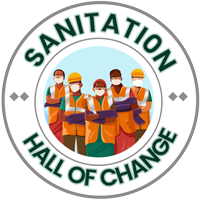Recounting his foray into the social sector, Niladri describes with fondness, an adventure trip he took with his friends, where he met a journalist from a daily newspaper who was both impressed and intrigued upon hearing that he was pursuing Environmental science and ecology. He suggested that Niladri look for opportunities in the social sector; a world which was completely alien to him at the time. Stirred by the conversation, he started applying for roles after completing his postgraduate degree and landed up in a grassroots organization in a remote place in West Bengal called Medinipur where he first learnt how to work together with communities.
When his journey with WSH began he encountered that the groundwater in West Bengal (among other states) was highly contaminated with arsenic – resulting in death and disease particularly in rural areas which lacked alternative sources of water. He worked with the Bengal Engineering and Science University to install an activated alumina-based filter and involved the community in its management thus bringing down the arsenic to permissible levels. This contributed significantly to bringing down the disease burden. “WSH is a big determinant of public health”, Niladri explains, “part of why it’s close to my heart.”
Of the firm belief that Inclusive Sanitation must also extend to remote and challenging terrains, Niladri had one such experience while working on an island in the Sunderbans, where setting up a sanitation supply chain was incredibly tough. When him and his team started off, the island had 0 toilets and over the course of just 1.5 years, working together with the community to solve their challenges, they were able to bring a toilet to every household – so that people would not have to resort to open defecation and instead be able to access safe and dignified sanitation. To be meaningful, sanitation services must be inclusive and reach the last mile.
Niladri recounts that earlier the spotlight used to mostly be on the challenges of rural sanitation. However, recently people started acknowledging the complexity of Urban Sanitation. The NFSSM Alliance has played a pivotal role in bringing urban sanitation, its urgency and complexity, to the centerstage. The Alliance has also provided a space for organizations to share their strengths with each other. Niladri regards the cross learning between organizations over the past year as a beneficial learning experience.
Upon a reflection of his long journey in the sanitation sector Niladri has observed it go through multiple changes. While earlier, in the sector, interventions used to be standalone or siloed, people have now started to proactively move towards scale. The role of the non-profit sector too has evolved. Non-profits are now working more symbiotically with the government in the capacity of technical support agencies – nudging and supporting the government. He says, “I’m so glad to see the insurge of fresh professional talent that the sector has witnessed. So many qualified young people are choosing to be in the sector purely out of passion, bringing a fresh and unbiased perspective to the work.”
Niladri is Senior Lead, Practice at Indian Institute of Human Settlements. He has close to two decades of experience as a development professional in the domain of water, sanitation, hygiene (WASH) and public health. He has worked with organizations like CARE, Water For People, PFI, Medic Synergy, IPE Global and has been an instrumental part of large scale WASH and public health program supported by bilateral agencies like USAID and DFID. He earned a Master of Population Studies from the International Institute for Population Studies, Mumbai, and a Masters in Ecology & Environment from Sikkim Manipal University.

